Here, my friends, is my list of the 10 Best Japanese Films of 2010. The astute viewer may note that Koji Wakamatsu’s Caterpillar, one of the most lauded of Japanese films this year is missing from this list. OK, OK, I missed any screenings of it, missed the theatrical run and haven’t seen it yet on DVD. Apologies.
Also, a couple of films that I saw this year, Live Tape and Bare Essence of Life / Ultra Miracle Love Story, by any measure should be on this list, but were actually released in 2009, so I made a somewhat arbitrary decision to leave them off. My apologies to Tetsuaki Matsue and Satoko Yokohama, the fine filmmakers who crafted those two films.
Unfortunately, many of these movies may never cross the pond to the USA, but a positive trend is that over the last year more and more Japanese DVD releases are featuring English subtitling. However, wherever and whenever you can catch these films, by all means do, subtitled or not.
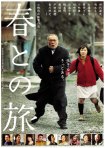 Haru to no tabi / Haru’s Journey
Haru to no tabi / Haru’s Journey
Tatsuya Nakadai’s performance as a cranky proud old man hitting the hard roads of Japan, humbling himself before his brothers and sister in hopes of one of them taking him in, shows an actor hitting new heights. Sure, he was brilliant in Harakiri and transcendent in Ran, but in Haru to no tabi he becomes sublimely human. Director Masahiro Kobayashi’s cold-eyed look at family dynamics and the current state of Japan finds him moving away from his strong formalism into a less austere style. He’s still austere here, but there’s not a single shot wasted in this heartfelt journey.
Website (Japanese)
–
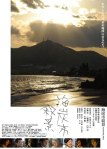 Kaitanshi Jokei / Sketches of Kaitan City
Kaitanshi Jokei / Sketches of Kaitan City
This has been a year for directors trying to make their marks with big sprawling Babel-esque sagas. Kazuhoshi Kumakiri’s beautifully shot and moving Sketches of Kaitan City takes a similar scenario, but the 5 stories don’t so much intersect as they fall on the same plot of ground, the fictional Kaitan City. The stories do build upon and against each other, though, weaving a tapestry of frayed and embattled lives. Sketches of Kaitan City is downbeat, near despair, but ultimately on the side of the survivors.
Website (Japanese)
–
 Nudo no yoru: Ai wa oshiminaku ubau / Night in Nude: Salvation
Nudo no yoru: Ai wa oshiminaku ubau / Night in Nude: Salvation
Night in Nude: Salvation is the ostensible sequel to the 1993 film of the same name. Starring Naoto Takenaka (the funny bald guy in Shall We Dance) as a hard-boiled everyman caught in a blood-soaked and perverse chain of events. Director Takashi Ishii, a sort of psychotronic Hitchcock-channelling prankster, puts Takenaka through a dark night of the soul that’s grisly, crazy and way fun. Standout performances abound from Takenaka himself, a trio of avenging hostess bar angels (Shinobu Otake, Harumi Inoe and Hiroko Sato) and good old Joe Shishido, mumbling through a role as a perpetually drunk incestuous mobster.
Website (Japanese)
–
Kore-eda’s longtime cinematographer, Yutaka Yamazaki, made his directoral debut this year with Torso. Following in the footsteps of Air Doll, Yamazaki takes on a story of a human loving a sex toy with a much different outcome than Kore-eda’s opus. Makiko Watanabe aces the role of a alienated woman “in love” with a blow-up male torso. Rising star Sakura Ando, playing her sister adds to the tension when discovers her secret desire. All in all, a taught and forgiving drama that makes loving an armless, headless, legless torso make sense.
Website (Japanese)
–
Kazuhiro Soda expands his vision of observational documentary with Peace. Taking on the big issue of peace, Soda finds his metaphors and images in the quotidian. Following his parents-in-law through their daily routine – dad taking care of stray cats and driving physically-challenged townsfolk in the back of his van to appointments, mom making visits to housebound retirees to make sure they’re taking care of themselves – Soda slyly coaxes out the big picture of what peace means to the humans and felines in question. Peace is filmmaking without a net, taking chances, going to unexpected places – and succeeding.
Kazuhiro Soda’s Blog (Japanese and English)
–
Yuichi Onuma, at last count, made no less than 3 movies this year, nude being his best realized. Based on the best selling autobiography by AV (Adult Video) star Mihara, nude chronicles a classic story of small-town girl coming to the big city, taken in by a tout, becoming an idoru (idol), and working her way through pinku to hard-core roles. nude works in not sensationalizing, but in drawing out the inner drama of a woman making adult choices and exploring the emotional cost of those choices.
Website (Japanese)
–
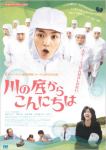 Kawa no soko kara konnichiwa / Sawako Decides
Kawa no soko kara konnichiwa / Sawako Decides
Sawako Decides plays it broad and slyly at the same time. Yuuya Ishii’s comedy is full of stupid funny bits, but ultimately builds a subversive theme where the heroes of the story find their transcendence and their inner peace through their mediocrity. While laughing one’s way to the decidedly depressing denouement, Ishii builds a perverse case for Japanese unexceptionalism through an exceptional person who just doesn’t realize it.
Website (Japanese)
–
At 98 years old, Kaneto Shindo still shows he’s got the chops and the smarts to pull off an incisive anti-war film, Postcard. The acting is expressionistic, the situations stilted, theatrical and broad, the pacing delirious – everything that modern entertainments are not. With strong central characters played by Etsushi Toyokawa and Shinobu Otake, the tragedy of a woman who loses one, then a second husband to the war (then her step-parents!) builds to a magical reconciliation – all the while keeping strong in its anti-nationalistic and pacifistic stand. Shindo has said that this will be his last movie. Let’s hope not.
–
 Noruwei no mori / Norwegian Wood
Noruwei no mori / Norwegian Wood
Ahn Hung Tran’s long awaited adaptation of Haruki Murakimi’s novel Norwegian Wood was all the big buzz in Japanese cinema this year. No matter the director is Vietnamese, now based in Paris. The adaption is solid. The acting is top-notch. The cinematography and production design evocative of a time where thing were not necessarily simpler. There are standout performances by Kenichi Matsuyama and Rinko Kikuchi, but particularly by newcomer, Kiko Mizuhara.
Website (Japanese)
–
The first 2 hours of Takahisa Zeze’s Heaven’s Story are brilliant – as are much of the remaining 2 and half hours. Unfortunately the film eventually implodes while tying up it’s many loose ends. It’s added to this list, not because it’s necessarily a great film – it’s not – but for its consistently great acting and moments, and dare I say a few hours of truly incredible filmmaking.
Website (Japanese)
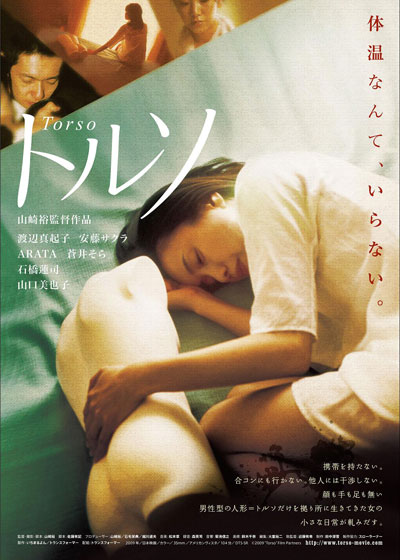
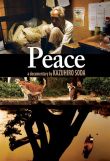




You must be logged in to post a comment.